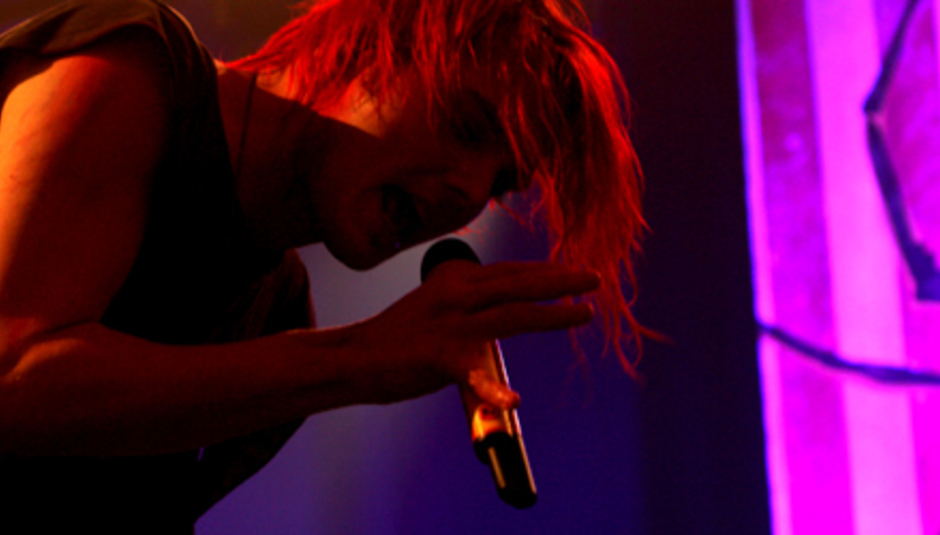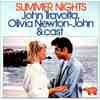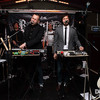Gerard Way needs to wash his t-shirt. But then, it’s probably all part of the futuristic vagabond image My Chemical Romance have taken on for their new album, Danger Days: The True Lives of the Fabulous Killjoys. Either way, DiS is sure his mother would disapprove.
Snuggled up in a big hoodie, Frank Iero, is fighting off the same illness that ironically struck Gerard down during their World Contamination tour. With wide eyes and bright smile, though, it'll take more than a little bit of Parisian flu to keep him down.
For one half of a massive award-winning rock band more often seen running around in crazy costumes in high budget videos - or being blamed in the tabloid press for all the world's ills - Gerard and Frank are startlingly normal.
The rumours that you're splitting up... that was just a big, silly misunderstanding, wasn't it?
Gerard: It's so funny!
Frank: Oh really? [blissfully unaware]
Gerard: It was just like an ubersensational headline on NME.com. They just took something totally out of context. I was just saying, this could be our last big adventure, so we should make it fun. That turned into, we're breaking up.
Frank: We haven't even played all the songs yet. That would be stupid.
Gerard: Not to stoke any fires, that's a false rumour.
You've spoken about ending up on the cover of men's lifestyle magazines and sort of fighting against that. Do you feel to an extent that it's a fight against growing up?
Gerard: I did, for a hot minute. But then I realised it's fighting against growing up the way people want you to grow up.
The song, 'The Kids From Yesterday', is so important to me and the band. It was the last song we recorded for Danger Days, and I had to write those lyrics to feel complete with this record. In recording that song, I came to be at peace with growing up and said, I have grown up actually, and I'm OK with that.
It feels good to have grown up. I like being an adult, because to me and the guys, we're defining what that is. What is great is that it came full circle. It started out as a fight against growing up and by the end it was like, no, I have, but I've just done it the way I wanted to.
Did you ever think, it's weird that the people reading these magazines would like my band?
Gerard: Well yes, but there's also a flattering aspect that comes with it, because you're like, that must mean we're handsome or something. You see fucking George Clooney – I love George Clooney – and Johnny Depp, who's a guy I look up to for the kind of person he is and the kind of roles he chooses...
It's flattering because you're like, oh cool, does that mean our band is now liked by thirty-somethings? I think it's more that they were expecting the record we were about to put out was going to be a record for people in their thirties which... it's a record for people of any age - I feel like a broader audience - but not a really close minded one. I don't know that it falls so gently in to what normally would be in those magazines.
Frank: Next year we'll be ten years old, and it sort of feels like if you've been there from the beginning, you've grown up with this band. But they're not the same thirty year old that was a thirty year old ten years ago. Yeah of course, every dude wants to be George Clooney, but that's neither here nor there. I think you're a different kind of thirty year old if you grew up in the times we grew up in.
Gerard: I think with these men's magazines it's like, there'll be a changing of the guard, almost. Call Of Duty 4 is going to be just as important as having a good watch or something like that.
Obviously there's a lot of people who don't like you...
Frank: To be blunt, yeah! I think that is such a testament to what we do. We're a band that you love or hate. I think the worst thing to be as a band or artist is... well, you'd never hear [MCR] in an elevator. You hear bands even that are out now, in elevators. Because you're indifferent to it. But this band is so loved and so hated that we polarise people, and that's fucking great. Shit's like the Cold War.
Gerard: And the hate side of things, that even feels like it's changed a bit. Now I kind of feel like those that we haven't won over, have just accepted it and are like, this doesn't irritate me any more. They're not so violent any more about it, which is cool. I think people are more accepting of the people that like it. That's what's exciting to me.
I'd like to think for the people who aren't in to the band, that they could at least look at the band and say, well they're doing something fucking crazy and different: these guys are running around the desert with ray guns, I've got to back that on some level. There are people who are normally not in to the band picking up on all the references and going, well these guys must be at least a little bit cool if they're referencing Blade Runner and stuff, as opposed to the more obvious stuff that a lesser band would do.
The Killjoys characters are inspired by your new comic...
Gerard: Yes, I was just inspired by these original drawings and concepts that I'd done with our friend Shaun Simon so there are going to be some major differences when you see the book. The character I've based my costume off of, he's a Mexican kid. He's named Mike Milligram and he's like... he's pretty different to what I ended up looking like.
When's the comic coming out?
Gerard: I keep talking to Shaun, and the comic companies. They've actually given me space, so that's been nice. But everybody wants to know. I think Christmas break is when I think I'm going to start really getting in to it. And then probably when we're on the road in January, start scripting. I would like it to be out this coming year.
You've spoken about spending more money on the band image this time. Does that mean we're in for a bigger stage show than Black Parade?
Gerard: I don't know if it'll be bigger. I think it'll be smarter, more artistic. I don't know that bigger is the way to go any more. If you watch Na Na Na, a hundred times more art went in to that than the development of Black Parade. But Black Parade was a far more expensive and large video. But because we were able to take our time, I got time to spend like coming up with logos, and going to the guys and saying, what do you want your gun to look like, and what do you want it to be called... and things like that. But that stuff all did cost a lot of money. To put it in perspective, the uniforms for Black Parade were about $5000 each.
Frank: A little bit more. I think the guns cost... about as much as the costumes.
Gerard: Colleen [Atwood, who did the Black Parade uniforms] really worked with us this time on the costumes. She did things on this cool DIY kind of budget, like, let's just grab a jacket from a shop and then we'll just eff with that, instead of just doing stuff from scratch. My jeans are Levis. They're like, $30 jeans that are just altered. That stuff was really fun. That's the cool thing about the whole project, like, yeah I'm wearing a jacket that cost like $1500, but my mask was eight bucks. The gun is more expensive than anything, and the mouse cat head is more expensive than the gun. It has this cool scale like, you could take a piece of junk and be like, it works in this universe.
What influenced the record?
Frank: At times necessity, and what I mean by that is, we went in to writing Danger Days as a four piece once again, and in doing that we needed electronics to really form that backbone and that kick. The skeletons of the songs were a lot of electronics, and we put down our instruments that we were very comfortable with. Ray and I on every other record just played guitars - I mean, here and there we'd dabble with a little bit of keyboards - but we really threw ourselves in to it this time around. You'd just take this synth or something like that, and be like, I'm writing the song on this, and how would I experience the song this way.
And then also I think a lot of cinema influenced the sound of it. Things from our past, like 70s Sci-fi.
Gerard: It was funny because we needed something to fight against – we didn't realise this – but the first attempt at the record was fighting against the ambition of the band and the Black Parade and things like that. That's not what Danger Days is. Danger Days ended up being the reaction to the boring rock record – and I hate throwing around words like boring: it's a great album and everyone worked really hard on it – but it's a reaction to that. So the rebellion's against this unheard album, which is really cool. I think survival instincts kicked in and said basically, if I don't evolve, I'm not going to survive. It was that very thing: we had to evolve or there was no survival.
What do you think would have happened if you'd released the abandoned record?
Gerard: I think we'd be back in the studio right now, if at all. You know what the record was starting to feel like? Like the sort of record where we would have put it out and asked other people what they thought of it. That's kind of scary. I would almost have been like, I don't know what the record is like until somebody reviews it, and then I would have been obsessed with that. Whereas this record, once it was done, I was like, I'm pumped, here you go, don't care what you think.
Frank: It's what it has to be. I agree with Gerard, if that record would have come out, it would have come out right before the summer, and we would have been done talking about it right now, and that would have been it.
Gerard: I think there would have been an extreme amount of dissatisfaction, especially once we would have started playing the songs live, it would have just felt like... just songs. Whereas now the stuff moves us and it's really what we're trying to say.
Obviously Black Parade had quite clear messages and themes – what are the key messages on Danger Days?
Gerard: Unfortunately they weren't. I mean, I'm glad you see it that way, but apparently the messages on Black Parade weren't clear at all. But I think the messages on Danger Days are extremely clear. I think this is why the lyrics were so hard for me, because I didn't have metaphor or poetry to rely on any more, or fiction. They had to be bold statements, like slogans. They had to mean something important, and that had to happen constantly throughout the album. So it goes from “Girl, You Gotta Be What Tomorrow Needs” to “Fame Is Now Injectable”, “Faith Is Unavailable”, there's so much just in the front end of the record. I think it's saying, freedom isn't easy. It's dangerous. It's a risk. It's easy to be clean, to clean up, it's hard to stay dirty. That's kinda what I feel like it's saying.
Given the aftermath of Black Parade, is there anything you wish you'd done differently?
Gerard: The only thing I wish I'd done differently was paying attention at all to the reaction to the album. I beat myself up about doing that, but it was really hard to ignore.
Frank: That's the thing, when it's in your face every day and people are telling you about it and asking if you feel responsible. It's like, fuck, man. You've got me in a cage and you're just poking me with a stick at that point. And no, I don't feel responsible, it's not my responsibility. But it's hard when that's all you see. You're in the bus, in a venue, in the bus, in a venue, in a bus, in a venue and that's what people are telling you is going on, and damning you for it. When really all you've done is travelled to the next city and performed. That's all you've done. And people are telling you that millions of miles away some kid got beat up for loving your band. That's fucked up.
Gerard: That happened a lot. I remember getting to Australia, turning on the TV and they were talking about kids at Big Day Out getting beat up and it's like, what the fuck, man.
I think it's a different thing this time, though. I don't expect to turn on the TV and see much of that. Not that I'd care this time. I can't in order to keep doing it. I can't care about that any more. Like, the aftermath really has to be a secondary thing that I can't give a shit about. I think that's kept the art pure, I think that's why it's so vibrant and fuck you and awesome and fearless, and the music sounds just like it looks, and the visual promises you so much danger and excitement, and the record delivers that. I think that doesn't happen very often.
But to put the bad stuff in perspective, you just have to Google 'My Chemical Romance saved my life'...
Gerard: Yeah I know! But that's a hard thing too. Because well... Frank, the way he puts it about them: they did that, not us.
Frank: They don't give themselves enough credit. I think it's great to inspire that, and to be the record that helps you get through something, but that's all it is. It helps you to do that; you're the one who actually did it. Our kids are really strong. They like to give us the accolades, but in fact it really is them. They're the heroes.
Twin Atlantic supported on your UK dates last month. How did that come about?
Frank: We decided to do local support, so we asked the people who lived here, what bands do you think are pretty awesome, and they sent me a couple of bands and I went to their MySpace pages, and they were a band that really stuck out. There are some other bands on this tour that fucking blew me away. There's some German bands that are great bands – a band called Adolar, and a band called Talk Radio Talk. It was so rad on this tour actually getting to see what was coming out of these places that we were playing.
Danger Days: The True Lives of the Fabulous Killjoys is out on 22nd November.






















